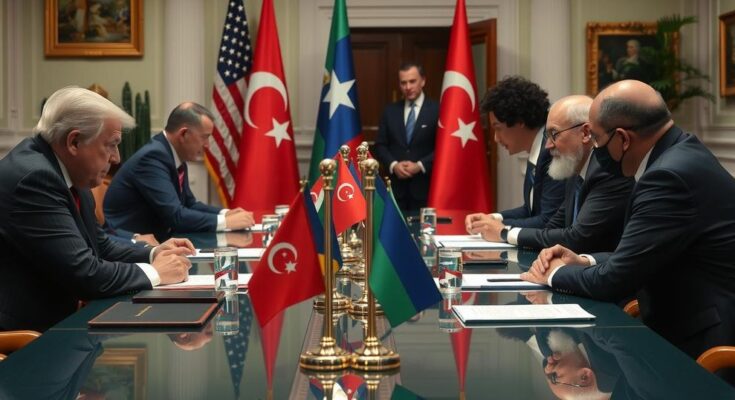Prime Minister Shehbaz Sharif of Pakistan met with Dr. Muhammad Yunus of Bangladesh at the D8 Summit in Cairo, generating concern in India over shifting regional dynamics. The leaders discussed simplifying trade and travel processes between Pakistan and Bangladesh. They acknowledged the importance of resolving historical grievances from the 1971 separation and emphasized enhancing bilateral cooperation across various sectors, including trade and cultural exchanges.
On Thursday, Prime Minister Shehbaz Sharif of Pakistan participated in a significant bilateral meeting with Dr. Muhammad Yunus, the head of Bangladesh’s interim government, during the D8 Summit held in Cairo. This encounter has elicited concerns in New Delhi, particularly regarding Bangladesh’s perceived shift in diplomatic alignment. Reports indicate that Prime Minister Shehbaz informed Dr. Yunus about the newly established procedures reducing customs inspections on goods from Pakistan and facilitating travel for Pakistani nationals to Bangladesh.
The relationship that India has fostered with Bangladesh appears to be weakening, creating apprehensions over a potential regional geopolitical shift. Traditionally, India has exercised a closer watch over its border with Bangladesh; however, this vigilance seems to be diminishing amid these developments. The discussions centered on enhancing trade opportunities across various sectors, including chemicals, cement, surgical goods, and information technology.
The cordial nature of the meeting underscored the historical, religious, and cultural connections shared between Pakistan and Bangladesh, as articulated by Prime Minister Shehbaz. Furthermore, gratitude was expressed for the administrative changes implemented by Bangladesh, which eliminated stringent inspections of Pakistani consignments and have simplified visa processes for Pakistani citizens. Additionally, Dr. Yunus emphasized the necessity of addressing lingering grievances stemming from the 1971 separation of Bangladesh from Pakistan to facilitate future progress.
Both leaders conveyed satisfaction with the improving trajectory of bilateral relations, advocating for the expansion of cooperation in diverse fields, including cultural exchanges. They acknowledged the significance of increased interactions among citizens, evidenced by sporting events and artistic performances. The dialogue concluded with a mutual commitment to collaborate further within multilateral groups, particularly the D-8 organization.
The meeting between Prime Minister Shehbaz Sharif and Dr. Muhammad Yunus comes against a backdrop of evolving geopolitical dynamics in South Asia. Historically, the relationship between Pakistan and Bangladesh has been complex, largely influenced by the 1971 civil war that led to Bangladesh’s independence. Recently, however, there has been a noticeable thaw in relations, particularly in terms of trade and cultural exchanges, prompting concerns in India regarding its influence over Bangladesh. India has long regarded Bangladesh as a key ally in the region, and the recent developments suggest a possible reorientation of Bangladesh’s foreign policy towards greater engagement with Pakistan. Such a shift could have significant implications for regional stability and India’s strategic positioning. The D8 Summit provided a platform for both leaders to discuss these critical issues, focusing on enhancing bilateral cooperation and promoting people-to-people contact.
The bilateral meeting between Prime Minister Shehbaz Sharif and Dr. Muhammad Yunus signifies a potential turning point in Pakistan-Bangladesh relations, which may have broader implications for regional geopolitics. With India expressing concern over the changing dynamics and the weakening of its traditionally strong ties with Bangladesh, both Pakistan and Bangladesh are now looking towards enhancing cooperation in various sectors. Addressing historical grievances and increasing cultural exchanges could serve as pivotal steps towards fostering a more collaborative future. Thus, these developments warrant close observation, particularly from India’s perspective, as they could redefine relationships in South Asia.
Original Source: dunyanews.tv




